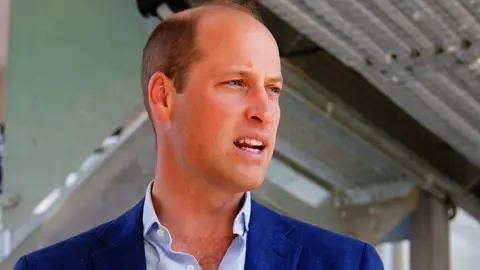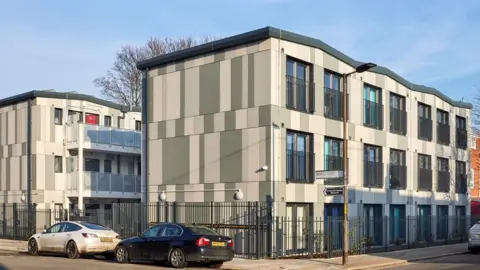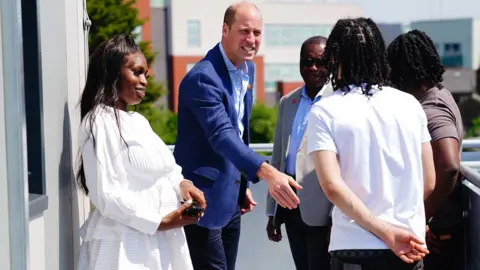Prince William sees homelessness help for young workers
 Victoria Jones
Victoria JonesThe Prince of Wales has opened a homelessness-charity project for young people in work or apprenticeships who need help finding affordable housing.
Centrepoint says the project opened by Prince William - bringing 33 new mini flats to Peckham, south London - is a response to the "housing crisis".
The homes are constructed in Hull and transported to London by lorry.
Residents will pay different amounts based on income, with the rent capped at a third of each tenant's pay.
And solar panels will cut heating bills to £200 per year.
Without stable accommodation, it could be impossible for young people to keep their jobs or to stay in training, the homelessness charity says.
Figures published earlier this year showed an average UK 11% annual increase in private rents, with some areas seeing over 20%.
The project provides independent living, Centrepoint's Sally Orlopp says, giving young people their own front door and a "stepping stone" for those struggling to rent or buy and who might have been stuck in temporary accommodation.
It also helps those facing other barriers, such as landlords wanting a previous track record of paying rent.

"It's not just in London, it's getting more and more difficult for young people," she says. And even so-called "affordable" property is often too expensive for many, with the charity estimating there are 129,000 homeless young people across the UK.
Prince William, patron of Centrepoint, met some of those moving into the low-cost housing units, called Reuben House, on his visit to Peckham.
 Jonathan Brady
Jonathan BradyThey have to be working more than 30 hours per week and earning no more than £32,000 a year.
The first residents have jobs in construction, information technology (IT), social services and hairdressing, Ms Orlopp says.
"This is a real mix of young people," she says, with the project challenging stereotypes about who might be at risk of becoming homeless.
 Victoria Jones
Victoria JonesThe project highlights the issue of work not necessarily protecting people from poverty - with the Trussell Trust charity reporting that about one out of every five people using their food banks is from a working household.
"There are many negative stereotypes associated with homelessness that are at odds with the evidence," Centre for Homelessness Impact chief executive Dr Ligia Teixeira says.
The research group says almost a quarter of households at risk of homelessness who ask local authorities for help include someone working.
Ms Teixeira welcomes Prince William's visit as a way of shifting attitudes on homelessness.
He could use "compassion, empathy and evidence to challenge stereotypes and prejudices and fundamentally change how homelessness is perceived, in the same way that his late mother, Diana, helped to shed the stigma associated with HIV [Human Immunodeficiency Virus] and Aids in the 1980s", she says.
The prince has made homelessness one of his biggest causes, also working with charities such as the Passage and the Big Issue magazine.
